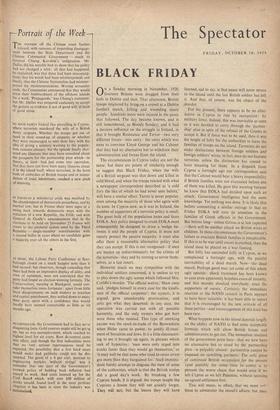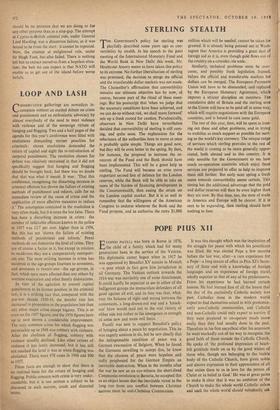BLACK FRIDAY
ON a Sunday morning in November, 1920, fourteen Britons were dragged from their beds in Dublin and shot. That afternoon, British troops retaliated by firing on a crowd at a Dublin football match, killing and wounding many people : hundreds more were injured in the panic that followed. The day became known, and is still remembered, as Bloody Sunday; and it had a decisive influence on the struggle in Ireland, in that it brought Resistance and Terror—two very different forces—into unity : the unity which was soon to convince Lloyd George and his Cabinet that they had no alternative but to withdraw their administration and forces from the island.
The circumstances in Cyprus today are not the same; but there are points of similarity enough to suggest that Black Friday, when the wife of a British sergeant was shot down and killed in cold blood, and when the troops reacted with what a newspaper correspondent described as 'a cold fury the like of which he had never seen before,' will have a similar effect. Terror is never popular, even among the majority of those who agree with its aims. In Cyprus now, as it was in Ireland, the number of supporters of a terrorist policy is small. The great bulk of the population hates and fears EOKA. Any policy designed to crush EOKA must consequently be designed to drive a wedge be- tween it and the people of Cyprus. It must not merely protect the passive majority; it must also offer them a reasonable alternative policy that they can accept. If this is not recognised—if men are beaten up indiscriminately for the crimes of the terrorists—they end by turning to terror thetn- selves, as a last resort.
However much we may sympathise with the individual soldiers concerned, it is useless to try to play down the ugly scenes which followed Mrs.
Cutliffe's murder. 'The official walrus,' Shaw once said, 'pledges himself in every case for the kindli- ness of the official carpenter'; the oysters, it is argued, gave unendurable provocation, and only got what they deserved; in any case, the operation was carried out with all possible humanity, and the only oysters who got hurt were those who resisted. This type of smirking excuse was the stock-in-trade of the Brownshirts when Hitler came to power, to justify ill-treat- ment of Socialists and Jews. It is a little disconcert- ing to see it brought up again, in phrases which reek of hypocrisy : 'men were only urged into trucks faster than they would go themselves,' or 'it may well be that some who tried to resist arrest got more than they bargained for.-Such explana- dons barely attempt to disguise the view of some of the authorities, which is that the British troops did a good day's work. By breaking a few Cypriot heads, it is argued, the troops taught the Cypriots a lesson they will not quickly forget. They will not; but the lesson they will have learned, sad to say, is that peace will never return to the island until the last British soldier has left it. And that, of course, was the object of the . Murder.
For the present, there appears to be no alter- .
native in Cyprus to rule by occupation: by military force. Indeed, this was inevitable as soon as it was decided to carry through the 'partner- ihip' plan in spite of the refusal of the Greeks to accept it. But if force was to be used, then it was the height of folly for the authorities to leave the families of troops on the island. Terrorists do not make distinctions between foreign soldiers and foreign soldiers' wives; in fact, men do not become terrorists unless the distinction has ceased to have meaning for them. In a dispatCh from Cyprus a fortnight ago our correspondent said that the Cabinet would bear a heavy responsibility if British families were not evacuated before one of them was killed. He gave this warning because he knew that EOKA had decided upon such an attack; Government intelligence had the same knowledge. Yet nothing was done. It is likely that before- committing a similar outrage to that on Friday EOKA will turn its attention to the families' of Greek officials in the Government. But before long—unless Grivas is at last captured —there will be another attack on British wives or children. In these circumstances the Government's failure to evacuate British families is inexplicable. If this is to be war until enosis is crushed, then the island must be placed on a war footing.
But folly has succeeded folly in Cyprus, as we complained a fortnight ago, with the painful inevitability of a dead march. Now—the dead march. Perhaps good may yet come of this whole ugly episode: shock treatment has been known to cure even apparently hopeless cases of insanity, and this murder shocked everybody, even the supporters of enosis. Certainly the immediate reaction at the NATO council in Paris appears to have been valuable; it has been able to report that it is encouraged by the new attitude of all three parties—and encouragement of this kind has been rare.
What happens now in the island depends largely on the ability of NATO to find some acceptable formula which will allow British forces and administrators to get out. The immediate reaction of the government press here—that we now have no alternative but to stand by the partnership plan—is palpably absurd : partnership cannot be imposed-on unwilling -partners: The only point of continued British occupation for the present (and possibly for some time to come) is to prevent the worse chaos that would arise if we left Cyprus as we left Palestine, without securing an agreed settlement first.
This will mean, in effect, that we must cni- tinue to administer the island's affairs; but then. should be no pretence that we are doing so for any other purpose than as a stop-gap. The attempt at Cyprus-is-British colonial rule, under General Lord Harding, was a disastrous failure, as it was bound to be from the start : it cannot be repeated. Now, the attempt at enlightened rule, under Sir Hugh Foot, has also failed. There is nothing left but to extract ourselves from a hopeless situa- tion; the best we can expect is that NATO will enable us to get out of the island before worse befalls.



































 Previous page
Previous page